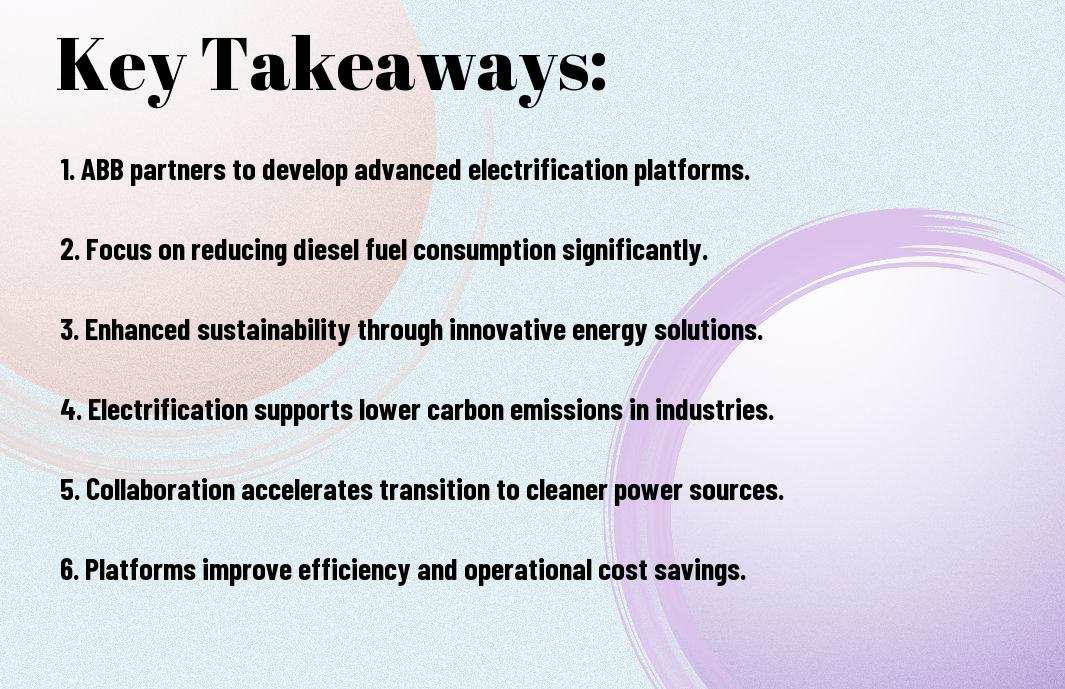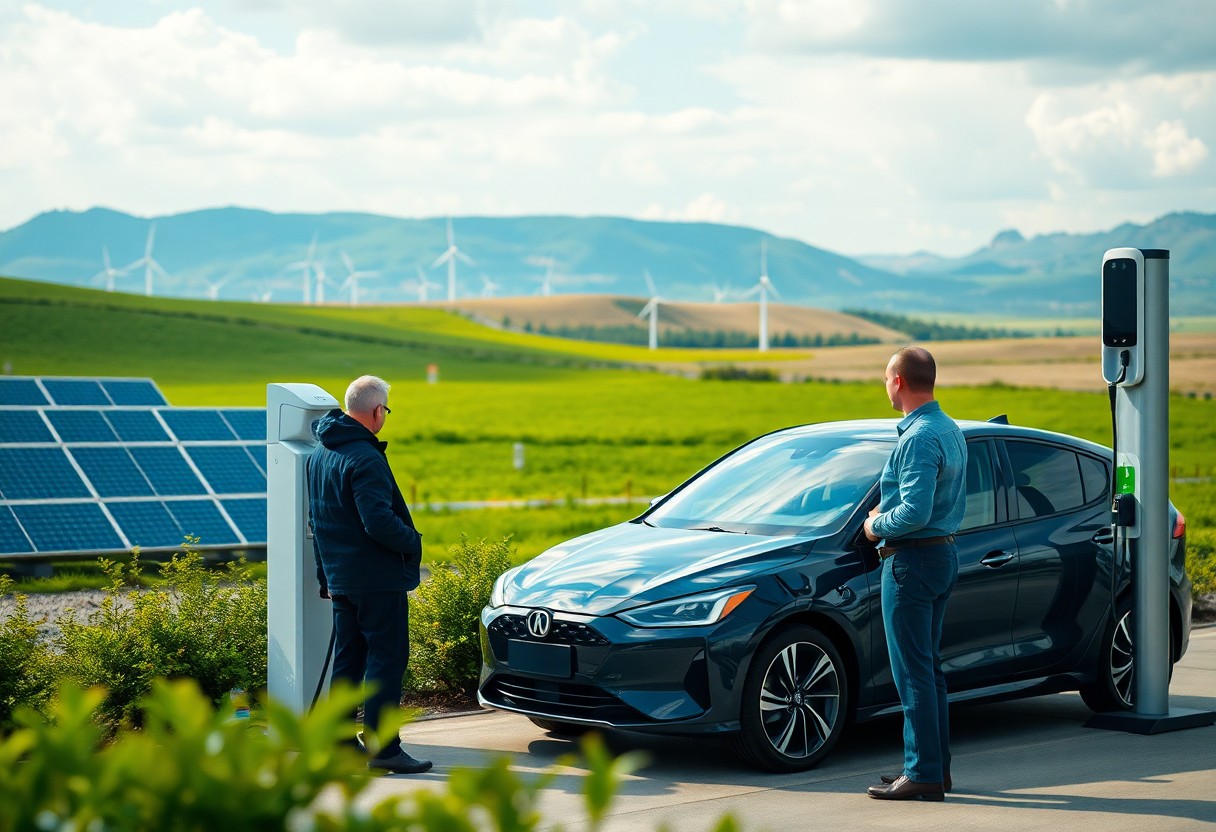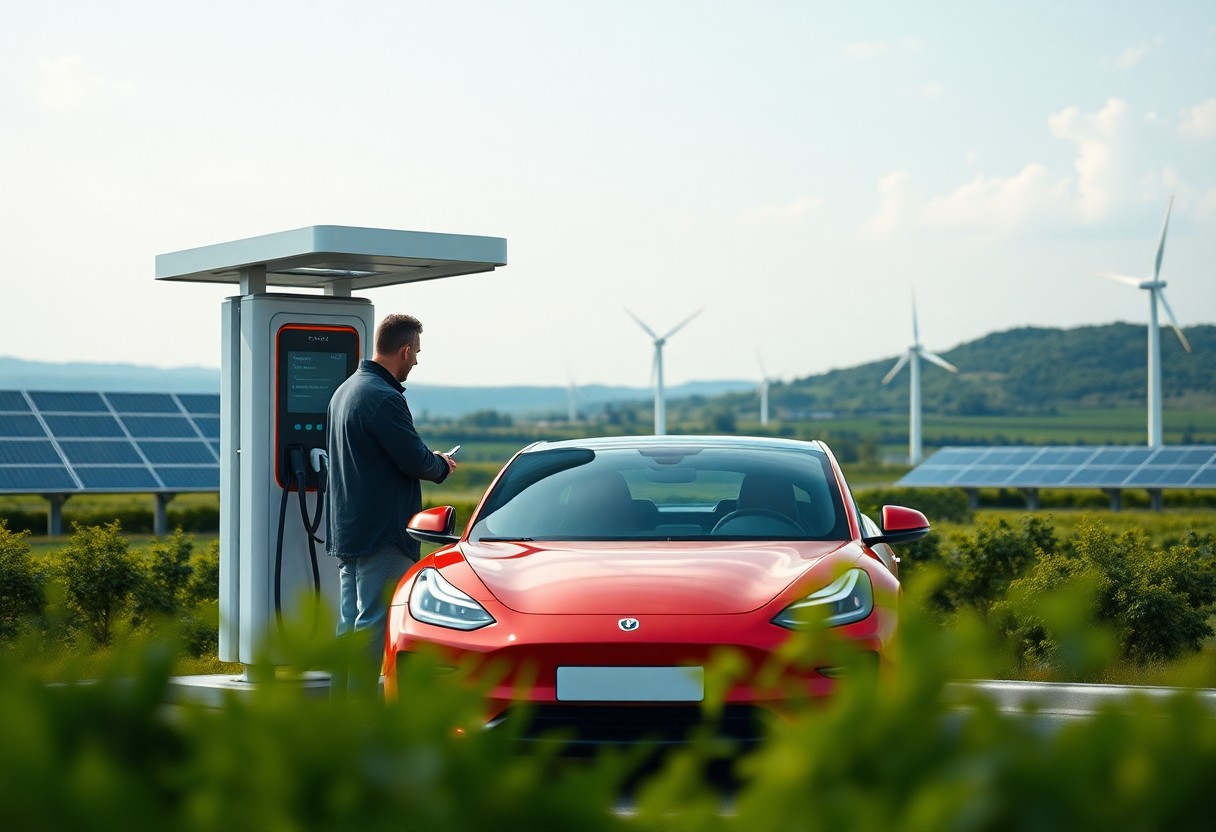There’s a pressing need for innovative solutions in today’s world as we strive to reduce our reliance on fossil fuels. I want to explore how ABB’s electrification platforms are not only helping to significantly lower diesel consumption, but also fostering sustainable practices across various industries. By collaborating with key players, you can see firsthand how this initiative positively impacts our environment and promotes a greener future. Together, we can embrace these technologies and make meaningful changes towards sustainability.
Key Takeaways:
- ABB’s collaboration focuses on integrating electrification technology to replace diesel-powered systems, aiming to decrease carbon emissions and promote cleaner energy solutions.
- The initiative highlights the importance of innovative platforms that enhance operational efficiency and sustainability across various sectors including transportation and industrial applications.
- By leveraging advanced digital tools and connectivity, ABB aims to create smarter energy solutions that support global efforts toward sustainable development and reduce reliance on fossil fuels.


The Need for Electrification
While the global demand for energy continues to rise, the urgency for sustainable solutions has never been more pressing. Traditional sources of energy, particularly fossil fuels like diesel, contribute significantly to environmental degradation and air pollution. As both consumers and businesses focus on minimizing their carbon footprint, electrification emerges as a viable alternative that can help mitigate these impacts while promoting efficiency and innovation within industries.
I believe that adopting electrification technologies not only paves the way for a greener future but also strengthens the resilience of our energy systems. Investing in electrification platforms allows us to enhance renewable energy integration, which ultimately can lead to reduced reliance on diesel consumption, fostering a sustainable environment for future generations.
Environmental Impact of Diesel Consumption
By using diesel as a primary energy source, we contribute to significant air pollution and greenhouse gas emissions, which are identified as major contributors to climate change. The combustion of diesel fuel releases particulate matter and harmful gases such as nitrogen oxides, which adversely affect air quality and public health. These environmental challenges highlight the urgent need for a shift towards cleaner energy sources that can reduce our dependence on diesel.
The transition to electrification not only addresses the harmful emissions associated with diesel but also promotes the increase of renewable energy sources. By leveraging technologies such as electric vehicles and energy-efficient machinery, we can significantly lower our environmental impact while improving the quality of life for communities vulnerable to pollution.
Economic Benefits of Electrification
Electrification presents numerous economic advantages that are worth considering. The initial investment in electric technologies can lead to substantial savings over time, as electric systems often have lower operational and maintenance costs compared to their diesel counterparts. Transitioning to electrification can reduce fuel costs, especially as renewable energy sources become more accessible and economically viable, creating a favorable return on investment for businesses.
Also, the shift towards electrification fosters job creation in the renewable energy sector, supporting local economies and driving innovation in clean technologies. With a growing demand for electric solutions, industries and businesses are positioning themselves to take advantage of new markets and trends, resulting in overall economic growth. In your pursuit of sustainable practices, embracing electrification not only benefits the environment but also enhances your economic stability and resilience in an ever-changing landscape.
ABB’s Electrification Platforms
Some of the most advanced solutions in the market today come from ABB’s electrification platforms, designed to assist various industries in minimizing diesel consumption while promoting a more sustainable future. Their comprehensive technologies are built to integrate seamlessly into existing systems, allowing businesses to transition smoothly toward electrification. With an emphasis on smart, efficient, and environmentally friendly solutions, ABB provides a portfolio that addresses electric power distribution and control for diverse applications.
Overview of ABB’s Technologies
For enterprises seeking to enhance their sustainability efforts, ABB offers a variety of technologies aimed at electrification. These solutions encompass innovations in power management, renewable energy integration, and low-voltage products. Each technology is designed to optimize efficiency and reliability, thereby reducing dependence on fossil fuels. As a result, ABB’s technologies enable organizations to become more resilient, adapting better to the evolving market demands while ensuring compliance with environmental regulations.
Key Features and Innovations
Around the globe, ABB’s electrification platforms stand out due to their rich array of features and innovative designs. They focus on enhancing energy efficiency and overall effectiveness, making them indispensable for any business aiming to lower its carbon footprint. These platforms use cutting-edge technologies such as advanced analytics and automation, which ultimately contribute to improved operational performance.
- Smart Grids for real-time monitoring and control
- Microgrid Solutions for localized energy management
- Energy Storage Systems to balance supply and demand
- Renewable Integration to enable seamless resource utilization
- Modular Designs for flexibility and scalability
Perceiving the advantages of these features facilitates a more profound understanding of the potential for enhanced sustainability through ABB’s electrification platforms. With the power to revolutionize how we manage electricity use, I believe adopting these technologies can lead to significant reductions in greenhouse gas emissions and promote a cleaner environment.
Innovations within ABB’s electrification platforms continue to evolve with trends in digitalization and automation, facilitating smarter, more efficient energy management practices. Whether it’s through improved renewable energy solutions or state-of-the-art automation systems, the platforms are meticulously designed to support varied applications and sectors. I see the rising need to embrace these innovations as not only an operational necessity but also a commitment to fostering a sustainable future.
- Digital Twins for predictive maintenance and operational insights
- Advanced Safety Features to mitigate operational risks
- AI Analytics for optimized performance and decision-making
- Seamless Connectivity with IoT for real-time data sharing
- Reduced Energy Costs through efficient usage and management
Perceiving the impact of these innovations reveals a promising landscape for organizations looking to adopt electrification as part of their sustainability strategies.
Collaboration for Sustainability
Unlike the traditional isolationist approaches taken by many industries, the drive towards sustainability demands a more synergistic strategy. By collaborating on electrification platforms, organizations can pool resources, share knowledge, and ultimately create innovative solutions that minimize diesel consumption while enhancing overall sustainability. The energy sector, in particular, stands to gain immensely from shared insights and technologies, enabling industry players to navigate the complexities of electrification more efficiently while contributing positively to the environment.
Partnerships and Collaborations
Collaboration is vital when it comes to tackling the pressing challenges of our time. By forming strategic partnerships, companies not only enhance their operational efficiency but also position themselves as leaders in the transition to sustainable energy solutions. These alliances pave the way for developing cutting-edge technologies that facilitate the shift towards electrification. When organizations work together, they can combine their unique strengths and innovate more rapidly, ultimately leading to greater reductions in emissions and enhanced sustainability outcomes.
Case Studies and Success Stories
Stories of successful partnerships serve as motivating examples of what’s possible when we unite for sustainability. I’ve seen how collaborative efforts can lead to transformative results that push the boundaries of what’s achievable in the electrification journey. It is compelling to examine just a few case studies that highlight the impact of strategic alliances:
- Project EVolt: A joint effort between ABB and various electric vehicle manufacturers led to a 20% decrease in diesel consumption in fleet operations in urban centers.
- GreenLine Initiative: Collaborative work with local governments resulted in 500 charging stations being installed, supporting the use of electric transit buses and reducing carbon emissions by 30%.
- Sustainable Port Project: Partnering with logistics companies allowed a 25% reduction in diesel-powered logistics transport within port areas over two years.
- Renewable Infrastructure Program: A collaboration involving energy providers that tactically integrated renewable sources saw a 40% increase in usage of clean energy within cities, significantly cutting down diesel dependencies.
Partnerships are the backbone of driving change and showcasing the potential of electrification platforms. By examining these successful case studies, I am motivated to continue collaborating with like-minded individuals and organizations to foster progress. Each story is not just a testament to the effectiveness of teamwork, but also an example of the positive environmental impacts that can be realized through dedicated partnerships. Together, we can make a significant dent in reducing diesel consumption and navigating towards a sustainable future.
Reducing Diesel Dependency
Once again, the need to address our diesel dependency becomes evident as industries worldwide grapple with the impacts of fossil fuel consumption on both the environment and their operational costs. By focusing on electrification platforms, we have the potential to significantly lower diesel use, which in turn enhances our sustainability initiatives. Transitioning to electric systems not only reduces greenhouse gas emissions but also enables companies to hedge against fluctuating fuel prices, thereby contributing to a more stable financial forecast and operational efficiency.
This shift away from diesel is not merely a trend; it is a necessity for organizations looking to align with global sustainability goals. With the right tools, technology, and partnerships, electrifying operations can be an achievable objective. Collaborating with industry leaders such as ABB helps businesses lead the charge towards electrification, enabling them to satisfy their commitments to environmental responsibility and gradually eliminate their reliance on diesel fuels.
Strategies for Implementation
Across various sectors, implementing strategies to reduce diesel consumption involves a comprehensive evaluation of current operations. Initially, I suggest conducting a thorough energy audit to identify areas where electrification can be introduced effectively. You may find that simply transitioning heavy machinery or fleet vehicles to electric alternatives can have an immediate impact. Collaborating with technology providers can also uncover innovative solutions tailored to your specific business needs, paving the way for a smoother transition.
Furthermore, engaging with your employees and stakeholders is necessary in this journey toward a greener future. By fostering a culture of sustainability, I believe you empower them to support electrification initiatives and contribute ideas for improved efficiency. This collaboration extends to forming alliances with other businesses and organizations focused on reducing diesel dependency, allowing for shared resources and knowledge that can elevate your success in electrification efforts.
Measuring Success and Progress
At the core of any electrification strategy, it is vital to monitor and evaluate your progress regularly. I encourage you to set clear metrics and key performance indicators (KPIs) that align with your sustainability objectives. Tracking energy consumption, emissions reductions, and cost savings not only quantifies your efforts but also highlights areas where further improvements can be made.
Further, I recommend conducting periodic reviews to assess whether the goals you’ve set are being met. By doing so, you can identify successes and areas needing adjustment, ensuring your electrification journey remains on track. Establishing a culture of accountability within your organization also fosters enthusiasm for sustainability, encouraging team members to understand their role in this transformative process. The more transparent your measurement and reporting are, the more effectively you can communicate your achievements to stakeholders and customers, reinforcing your commitment to reducing diesel dependency.
Future of Electrification
Now that we are witnessing significant advancements in electrification technologies, it is important to consider what the future holds. With the gradual phasing out of diesel energy sources, I find myself optimistic about the integration of electrification platforms across various sectors. The collaboration between companies like ABB and other industry leaders is helping to drive innovation, ensuring that electrification not only meets the increasing demand for energy but does so in a sustainable manner. I believe that we can expect greater efficiency in energy consumption, as well as a wider array of electric solutions tailored to different applications, fundamentally transforming how we perceive energy use in our societies.
Trends and Predictions
Predictions indicate that the shift towards electrification will accelerate significantly in the coming years. As regulatory frameworks become more stringent regarding emissions and sustainability, you might witness an increasing number of companies investing in electric solutions as a competitive advantage. I foresee that advancements in battery technology will continue to improve the affordability and efficiency of electric systems, making them the preferred choice over traditional diesel options. Additionally, with rising public awareness about climate change, consumers are likely to demand more sustainable practices from businesses, further propelling the electrification movement.
Potential Challenges Ahead
Below the surface of these positive trends, it is important to acknowledge that various challenges lie ahead. While electrification is a promising path, I recognize that the transition is not without its obstacles. You may encounter limitations in existing electrical infrastructure and the significant initial investment required for widespread adoption. Furthermore, there can be concerns regarding energy storage and transmission capacity as we increase our reliance on electrification. It is vital to address these challenges proactively to ensure that the benefits of switching to electrification platforms become reality.
Trends indicate that transitioning to electrification will require careful management of all aspects involved. You may face issues related to the availability of rare materials for batteries, along with the environmental implications of increased mining activities. Another concern could be the need for a significant overhaul of our electrical grids, as they may not be equipped to handle the increased demand for electricity. By staying informed and adapting to these challenges, I believe we can embrace electrification as a sustainable alternative to diesel consumption.
To wrap up
On the whole, my exploration of ABB’s initiatives in electrification platforms has highlighted a significant shift towards reducing diesel consumption and enhancing sustainability across various sectors. By embracing innovative solutions, I see how ABB enables industries to pivot from traditional energy sources to more sustainable electrified alternatives. This transition not only contributes to lower emissions but also promotes a greener future for all of us.
If you are keen to learn more about how ABB is playing a pivotal role in these advancements, I highly recommend checking out this article on How is ABB Electrification Boosting Decarbonisation?. Understanding these developments can enhance your knowledge of the ongoing efforts in electrification and sustainability, equipping you with insights that could inform your own environmental strategies.
Q: How does ABB’s electrification platform contribute to reducing diesel consumption in industries?
A: ABB’s electrification platform offers innovative solutions that transition various industrial processes from diesel and fossil fuels to electric power sources. By implementing technologies such as energy-efficient motors, power distribution systems, and smart automation, businesses can achieve significant reductions in diesel usage. This transition not only optimizes energy consumption but also improves operational efficiencies, leading to lower overall energy costs and reduced environmental impact.
Q: What role does collaboration play in enhancing sustainability through ABB’s electrification platforms?
A: Collaboration is pivotal in ABB’s approach to developing electrification platforms. By partnering with industries, governments, and other stakeholders, ABB can tailor its solutions to meet specific sustainability goals and regional energy requirements. These partnerships foster knowledge-sharing and the exchange of best practices, allowing for innovative approaches to tackle challenges related to diesel consumption. Joint efforts can accelerate the adoption of cleaner technologies and drive systemic change toward sustainability across sectors.
Q: What specific solutions or technologies does ABB offer to support electrification and sustainability in various industries?
A: ABB provides a range of advanced technologies aimed at supporting electrification and enhancing sustainability. These include smart grid solutions that improve energy management, electric vehicle (EV) charging infrastructure, and integrated systems that enable renewable energy sources like solar and wind to power operations. Additionally, ABB offers digital solutions featuring real-time data analytics and machine learning capabilities, which help organizations optimize their resource usage and reduce dependence on diesel fuels while tracking their sustainability progress.









